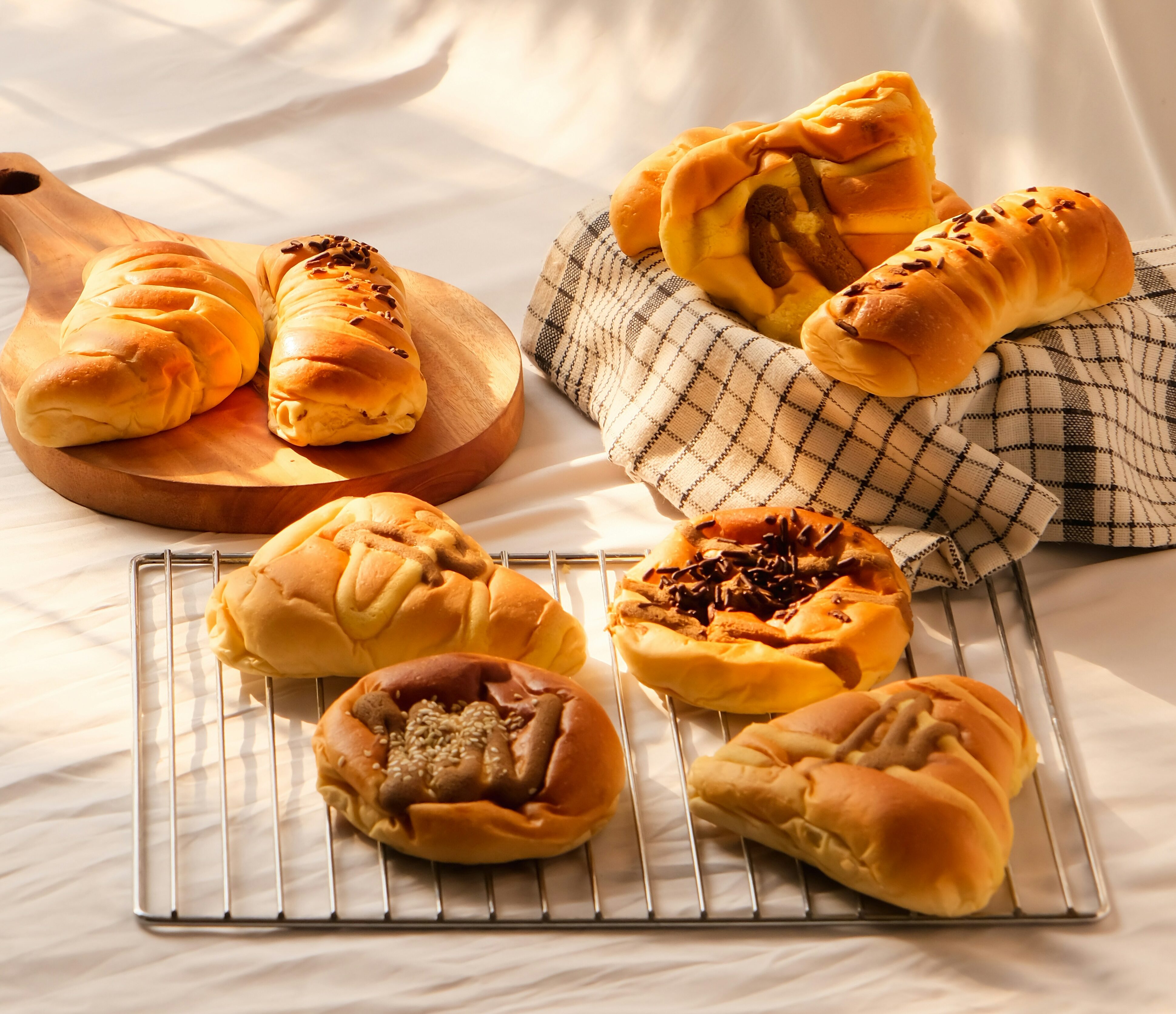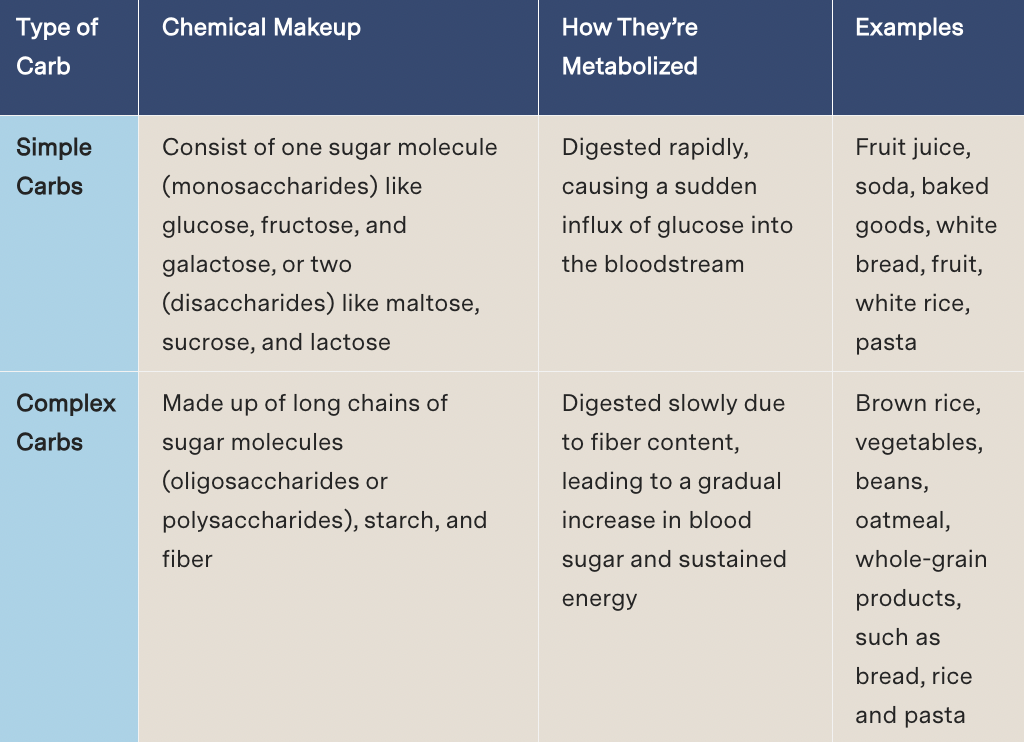Ever wondered if that late-night sweet treat or big pasta dinner is helping—or hurting—your shuteye?
The impact of eating carbs before bed on your sleep quality isn’t one-size-fits-all. It depends on what kind of carbs you’re eating and when. Some, known as simple carbs, can disrupt your rest, while others—complex carbs—might actually help you sleep better.
Your body metabolizes these types of carbs differently, which plays out in various ways when you drift off to dreamland. Keep reading to learn more about the impact of eating carbs before bed.
| Member Tip: Opt into Oura Labs to test the new Meals feature, which allows you to log your meals to see how their timing and contents may interact with your sleep quality. You’ll receive personalized insights on how your meals may impact your daily energy and nighttime recovery. |
What Are Carbs?
Carbohydrates include a wide range of foods, from cereal and fruit to even yogurt and salad dressing. All carbs break down into glucose—aka energy for your cells—during digestion, but your body metabolizes different types of carbs in different ways.
Your metabolism refers to the various processes in your body that help work to sustain life. These include converting food into glucose, repairing damaged tissues, creating new cells, and eliminating waste and byproducts.
After carbs are broken down into glucose, your bloodstream absorbs the glucose and transports it to your cells, where it’s used immediately for energy or stored for later use. Your body metabolizes the two types of carbohydrates in different ways, which impact how quickly glucose enters your bloodstream.
Simple vs. Complex Carbs: What’s the Difference?
Simple carbs are commonly found in sugary snacks or white bread. Your body tends to break these down quickly, causing a rapid spike in blood sugar. In contrast, complex carbs, found in whole grains, vegetables, and legumes, break down more slowly, leading to a gradual release of glucose.
Why this matters: The rate at which your body metabolizes glucose affects your energy levels, blood sugar stability, and overall health.
Rapid spikes in blood sugar from simple carbs can lead to energy crashes, increased hunger, and long-term issues like insulin resistance. On the other hand, the slower digestion of complex carbs provides a steady energy supply, helps regulate hormones, and supports better metabolic health.
How Simple Carbs Affect Sleep

When you eat simple carbohydrates, a series of hormonal and physiological changes take place, which can negatively impact sleep. These include:
- A rapid spike in blood sugar followed by a crash: Simple carbohydrates digest quickly, causing a sharp rise in blood sugar. This in turn prompts an insulin response to lower blood sugar levels, but the quick drop that follows—known as reactive hypoglycemia—can leave your body struggling to stabilize. These fluctuations disrupt energy balance and are linked to frequent nighttime awakenings, interfering with your ability to stay asleep.
- Interaction with melatonin: Melatonin is a hormone naturally produced by your body that initiates sleep. However, when melatonin levels rise, it can reduce glucose tolerance and insulin sensitivity, making it harder to clear glucose from the bloodstream. If glucose isn’t cleared efficiently, it remains in circulation, leading to unstable energy levels, increased inflammation, and potential nighttime disruptions that can disrupt your sleep.
- Cortisol production: Cortisol, the stress hormone, helps regulate blood sugar and is sensitive to carbohydrates. When blood sugar levels start to crash, your adrenal glands make extra cortisol to raise it back up. This heightened amount of cortisol in the bloodstream can disturb your sleep.
- Kidney response: High blood sugar levels cause your kidneys to overcompensate to try and help filter out the excess glucose from the blood. One side effect of this can be more frequent urination, causing you to wake up at odd hours of the night.
| Member Tip: If you eat a lot of sugar close to bedtime, it may show up in your Oura data as a higher-than-normal resting heart rate, particularly in the first half of the night and lower heart rate variability (HRV). Your sleep data may also show signs of less deep sleep, lower Restfulness, and a longer Sleep Latency. |
READ MORE: Why You Wake Up at 3am — And How to Go Back To Sleep
How Complex Carbs Affect Sleep

Complex carbs are a better choice before sleep for a number of reasons. Since your body digests them more slowly, it leads to a gradual and sustained glucose release. This helps maintain steady blood sugar levels throughout the night. This stability is associated with less interrupted sleep and higher-quality, deeper sleep.
A study compared the sleep of people who ate simple versus complex carbs. The researchers discovered that the simple carb group had a higher sleeping metabolic rate and higher cortisol levels, suggesting that their bodies were forced to work harder and forgo restorative shuteye.
Another study suggested that complex carbs actually led to better sleep. The researchers found that, among a group of medical students, sleep was strongly influenced by how many complex carbs (whole grains) they ate. The odds of participants sleeping well were 3.26 times better when they ate complex carbs.
TL;DR: If you want to benefit from eating carbs before sleep, opt for complex carbs.
| Member Tip: Eating complex carbs before may also be evident in your Oura data. You may notice you have better Sleep Efficiency and fewer nighttime awakenings. You also may feel more relaxed, helping you fall asleep faster. |
What to Eat (and When!) for Better Sleep
 The bottom line: Carbs are not the enemy. In fact, eating a very low amount of carbs in your diet (think keto or paleo diets) can negatively impact sleep quality. Numerous studies have found that low-carb diets reduce the amount of deep sleep and REM sleep.
The bottom line: Carbs are not the enemy. In fact, eating a very low amount of carbs in your diet (think keto or paleo diets) can negatively impact sleep quality. Numerous studies have found that low-carb diets reduce the amount of deep sleep and REM sleep.
Instead, focus on choosing the right carbs at the right time. Throughout the day, add “good carbs” to your meals, such as:
- Whole grains like brown rice, whole-wheat bread, and quinoa
- Prebiotic carbs like oatmeal, underripe bananas, apples, or wheat bran
- Fruit (even though fruit does contain simple sugars, it also contains complex carbs and fiber, which can help to slow the glucose release)
- Root vegetables like beets, parsnips, and turnips
- Legumes like lentils, black beans, and chickpeas
Timing comes into play too. Try to give your body time to “rest and digest” before you go to sleep. Research shows late-night eating can lead to increased sleep latency, poorer sleep efficiency, and fewer minutes of REM and deep sleep.
Allowing at least three hours between your last meal and going to sleep provides a chance for your body to digest, so that during the night, it can focus on rest and recovery instead.
READ MORE: 8 Foods and Drinks For Better Sleep
About the Oura Expert
Emilina Lomas, MSc, R.Nutr., is a registered nutritionist and health writer for Oura. After finishing her master’s degree in Nutrition and Public Health at London Metropolitan University, Emilina worked as a nutritionist and health coach. She is also the author of Gut Healthy, Mind Happy, a book about gut health and diet.












